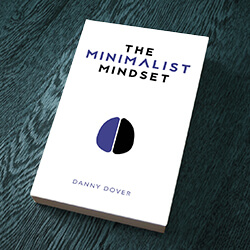Today I want to share with you the greatest financial advice that I have ever received. (Special shoutout to my friend, Sam Niccolls for the sage advice!) Like a lot of great wisdom, this idea involves a small but important change in perspective.
What Is A Money Mindset?
From my perspective, a Money Mindset is a worldview that influences your behaviors and tendencies with regard to how you use your money.
You can think of it as the unconscious driver of your money-related behaviors. It can certainly be overwritten by conscious thought (“I don’t think I want to pay that much to upgrade to first class.”) but it controls the countless small financial decisions that don’t earn your full conscious attention (“20 cent tax, no problem”).
As you can imagine, your Money Mindset can have a great impact on your life, especially as you’re looking to make smart financial decisions that set you up for success in the future.
The Greatest Financial Advice That I Have Ever Received
The greatest financial advice that I have ever received from an advisor was to acknowledge my Money Mindset and then take an action to keep that normally subconscious mindset in my conscious mind by rewarding myself in an abnormal way. This concept takes some deconstructing in order to fully grasp.
Simply acknowledging your normal financial bias is not enough – you need to give yourself a reward in order to condition yourself to continually keep your financial bias in mind. This way, when it comes to the seemingly unimportant financial decisions of your life, you will know your tendencies and have the conscious awareness and willpower to act against them.
How To Identify Your Money Mindset
To keep things simple, lets identify two extreme mindsets, The Ultimate Saver and the Spontaneous Saver.
The Ultimate Saver – On any typical day The Ultimate Saver tends to save more than they spend. In this mindset, financial priorities are in the future and the present is mainly a pathway to what comes ahead. When friends today invite The Ultimate Saver on a spontaneous trip, The Ultimate Saver politely and eloquently declines thinking that more important experiences may lay ahead.
The Spontaneous Saver – On any typical day The Spontaneous Saver tends to prioritize the here and now over the possibilities that may or may not materialize in the future. The Spontaneous Saver knows that life is unpredictable so they spend their money on what they know for sure will make them most happy now. When their friends invite them on a spontaneous trip they are the first to say yes regardless of how it may affect The Spontaneous Saver’s other priorities. However, they still know and understand the importance of saving for the future.
From what I’ve observed, no person fits either of these examples all of the time. Instead, a majority of people fall somewhere between the two. Money Mindsets exist on a spectrum. People are complex creatures. :-)
To explore this idea further, consider the catalyst for this article, new data on the typical young adult money mindset. (Source: Capital One’s Millennial Mindset on Money Survey : Attitudes on spending, saving and sharing amongst adults under 30 (21-29) – December 2015)
1. Two thirds (67%) [surveyed] said they would rather have a steady job with a modest income than become a millionaire with a chance of going broke within a few years.
2. [With regard to romantic relationships] more than one in ten (13%) say being irresponsible with money is a deal breaker for them, and even more (14%) say being a money moocher is a deal breaker.
3. More than a quarter (27%) said that establishing a solid nest egg would give them the biggest feeling of accomplishment.
4. When asked what they would do with a $100 cash holiday gift, 40% of Millennials said they would use the cash to increase their savings balance.
5. Nearly half (45%) of Millennials say they would use Facebook to access and manage their money – significantly more than any of the other leading social media platforms (Instagram, Twitter, and Snapchat).
I found this research to be an interesting point of reference for comparing to my own Money Mindset. According to these survey results, the typical Millennial is similar to the before-mentioned Spontaneous Saver mindset but with a curious streak of Ultimate Saver mixed in. (See the first result which shows two thirds of respondents (67%) preferring financial security over millionaire status and the fourth result which shows 40% saving holiday cash gifts.)
Applying This To Your Life
So, in my opinion, how does one make this information useful?
Take a moment and think about which of the before-mentioned Money Mindsets matches most closely to your default financial tendencies. (Remember you are unlikely to fit either option 100%, instead look for the option that most closely matches your normal tendencies.)
Which of the two options discussed (Ultimate Saver or Spontaneous Saver) best describe your natural way of being?
- I tend to be an Ultimate Saver and stash away most of the money I earn for the future.
- I tend to be a Spontaneous Saver and use my money more in the present, while also saving some of my money for the future.
Identifying your money mindset gives you a powerful advantage over your peers. If you know your default tendencies, you can more accurately predict your future.
Your Earned Reward
Once you have identified your personal Money Mindset, take action and treat yourself by doing something out of the ordinary. This comes in two parts:
First of all, publicly acknowledge your Mindset. Feel free to remain anonymous (after typing your comment below, click into the Name field and then click the checkbox labeled “I’d rather post as a guest”), take action and make your acknowledgment stick by putting it out into the world.
Secondly (this is the fun part), identify one tiny action you can take against your bias to reward yourself. The goal here is to condition yourself to continually keep your financial bias in mind so that you can benefit from positively influencing your small financial decisions.
Here are some examples of what you might comment and do:
- I tend to be an Ultimate Saver so I am going to treat myself to a special coffee to celebrate today.
- I tend to be a Spontaneous Saver so I am going to open a savings account with an automatic savings plan.
- I tend to be an Ultimate Saver so I am going to put a little bit more of my paycheck into my “spending money” account this month.
- I tend to be a Spontaneous Saver so I am going to put all of my coins into a jar in my room and put the money into savings when it gets full.
I am looking forward to reading everyone’s acknowledgments below!
The simple acts of acknowledging my Money Mindset and then rewarding myself for doing so has made a tremendously positive impact on my financial life. You can benefit from this too by taking the steps yourself. The best way to improve yourself is to take action while surrounding yourself with others who prioritize these positive actions.
Disclosure: This post is sponsored by Capital One; however, all opinions expressed are my own.








